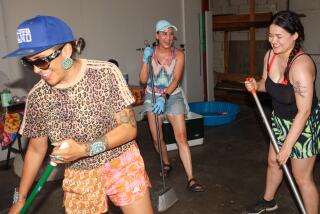Relic of ‘60s Now Operates a Successful Business : Reality Brings Change in Idealistic Commune
- Share via
MINERAL, Va. — Here at the end of a long dirt road, isolated in oak woods, a relic of 1960s hippie culture operates today as a $1.5-million enterprise for people who work hard, shun drugs and scoff at Utopian dreamers.
Twin Oaks, one of the oldest communes in America and probably one of the last left from the psychedelic ‘60s, has come a long way from its origins in “The Age of Aquarius.”
“We started out with idealistic beliefs, thinking all we needed was some land to build a better life,” said Gerri, 36, who has lived on the 400-acre commune for 15 of its 18 years and who, like most of the 80 or so residents, uses no surname.
“But we had to deal with the economic and social aspects of keeping that piece of land and co-existing peacefully.”
As a result, residents became increasingly absorbed in such workaday concerns as mortgages, taxes and health care.
Dreamers Soon Leave
“Dreamers drift into this place and out again when they find their dreams unfulfilled,” Gerri said. “Those who wish to escape the realities of life are the ones unable to cope here because we are too realistic.”
A commune is a small community where people with a shared goal work together at simple tasks--a notion that appealed to the escapist “flower children” of the ‘60s.
There is no accurate count on the number of communes that sprang up across rural America, but only a handful are thought to remain. Twin Oaks, with an estimated $1.5 million worth of property and cottage-industry equipment, is undoubtedly one of the most successful.
It sits 100 miles south of Washington, in worn-out gray clay farming country that is one of the poorest parts of Virginia’s Shenandoah Valley.
There are 11 makeshift buildings on 400 acres of woodland and open fields that are washed by a sluggish ‘Everyone works at something they like and things get done.’
--Keenan, son of an ex-Central
Intelligence Agency agent
river. Residents range in age from 6 months to 63 years. The biggest segment seems to be people well into their 30s.
They vary in background from college-educated professionals to artisans, mechanics and school dropouts.
Gone are the days when Twin Oaks’ denizens wore long hair and multicolored psychedelic clothing, whiling away the hours listening to music in a haze of drugs.
“Drugs are illegal in Virginia and we don’t want them here,” said Gerri. “Now the commune has grown up.”
What has not changed is the desire to live apart from society and according to the old communist precept: Each is to work according to ability and consume according to need.
The main industry is production of handmade hammocks and rope chairs, many of which are sold in markets patronized by the materialistic suburb-dwellers that Twin Oaks founders despised.
Commune officials said sales grossed about $400,000 last year. Production in a rugged cedar clapboard shop runs from 11,000 to 13,000 hammocks and 2,000 rope chairs a year.
48-Hour Weeks
The 65 adult members work a 48-hour week at farming and livestock tending, as well as weaving.
“Everyone works at something they like and things get done,” said Keenan, 25-year-old son of an ex-Central Intelligence Agency agent.
Planting and harvesting 100 acres of agriculture ranging from apples to zucchini enables the commune to be 70% self-sufficient. Other necessities, such as soap and coffee, are purchased from stores nearby.
“Everything is done in a big way in America. Twin Oaks is no different. There’s so much land,” said Stefan Waechter, a visitor from West Germany, who was eating a vegetarian lunch and drinking fresh cow’s milk in a sunny courtyard.
The commune’s 15 children, aged from 6 months to 12 years, played or lazed in the shade. Up to the age of 5 or 6 they learn communal values at a preschool on the premises. After that they attend a school nearby taught by certified teachers as Virginia law requires.
“We want our children to learn the basic skills such as math and reading, to learn non-sexist values, a respect for life and themselves before being taught in open classrooms,” said Gerri, who is raising two children, 8 and 12 years old, on the commune with her husband, Will.
Although members claim not to be materialistic, their values have shifted from the search for a “simpler way of life” of 18 years ago. Stereos, cars, personal computers and other expensive convenience items are found on the commune.
Everyone has a private bedroom, though only the size of a large closet, in a dormitory-style building called “Harmony.”
But baths are “communal,” not private. Clothes, books and other personal items are also shared.
“We may have stereos and computers, but the property we have collectively isn’t anywhere near what the middle class has,” Gerri insists. “Television is not watched here because it’s too violent. We watch movies on VCR. That way we can control what we watch.”
No religious or national celebrations are observed, although there are four holidays a year based on the seasons.
More to Read
Inside the business of entertainment
The Wide Shot brings you news, analysis and insights on everything from streaming wars to production — and what it all means for the future.
You may occasionally receive promotional content from the Los Angeles Times.










